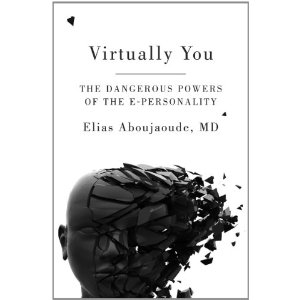Elias Aboujaoude is a psychiatrist who serves as Director of the Impulse Control Disorders Clinic and the Obsessive Compulsive Disorder Clinic at Stanford University School of Medicine. His research interests have focused on obsessive compulsive disorder and behavior addictions, including problematic Internet use. Aboujaoude has written two books: Compulsive Acts: A Psychiatrist’s Tales of Ritual and Obsession (2008) and Virtually You: The Dangerous Powers of the E-Personality. Additionally, he co-edited the book Impulse Control Disorders (2011). For more information, visit his website.
Book Basics
Virtually You: The Dangerous Powers of the E-Personality is an eye opening exploration of how radically the internet has impacted people’s personalities. As people spend more and more time online, something about their identity changes. The newly constructed e-identity is “a virtual whole that is greater than its parts and that, despite not being real, is full of life and vitality.” It is “more assertive, less restrained, and a little bit on the dark side, and decidedly sexier” (p.20). While some intentionally create a new identity online, most simply refashion their identity to make themselves appear better than they actually are.
Following the introduction, the first half of the book is an exploration of five psychological forces that Aboujaoude has observed are asserted as a part of the e-personality: grandiosity, narcissism, darkness, regression and impulsivity. As the amount of time people spend online in all areas of life increases, the lines blur between one’s identity and e-identity, which often is more harmful than helpful. Hence, the second half of the book considers how the shifts in e-personality are impacting life offline, especially with the tendency to reconfigure one’s offline personality into the image of one’s e-personality.
asserted as a part of the e-personality: grandiosity, narcissism, darkness, regression and impulsivity. As the amount of time people spend online in all areas of life increases, the lines blur between one’s identity and e-identity, which often is more harmful than helpful. Hence, the second half of the book considers how the shifts in e-personality are impacting life offline, especially with the tendency to reconfigure one’s offline personality into the image of one’s e-personality.
As the trend toward spending more time online continues, it will be increasingly important to understand how this impacts life offline. Educators, clergy, parents must be engaged in developing a deeper understanding of this trend and its many implications.
So What?
In his concluding chapter Aboujaoude summarizes the intent of his book and suggests the challenge each of us now faces:
This book is not intended as a manifesto for renouncing the virtual world. It would be both naive and futile to preach that – no one can imagine life without Google, and, even if it were possible, few people I know would be interested in living it. . . My goal, then, is less painful and more modest than to suggest we log off. I have tried, instead, to offer a note of caution, an exhortation to think before we click, to proceed in the virtual world with increased caution, knowledge, and, above all, self-knowledge. Just as a teenager becomes one naturally, without planning on it or necessarily working toward it, we all have, whether we approve it or not, already come of age as virtual beings. We cannot, any more than a teenager can, reverse the clock or unrelease those hormones. The question before us is what to do with ourselves now, not how to capture some romanticized pre-virtual innocence (p.288-289)
How have you experienced the blurring of the online-offline personality in your interactions with friends, family members and colleagues? With an increased awareness that your online world and offline world are not independent realities, what can you do to live wisely, authentically, and proactively?
Elias Aboujaoude. Virtually You: The Dangerous Powers of the E-Personality. W. W. Norton & Company, 2011. ISBN: 9780393070644.
